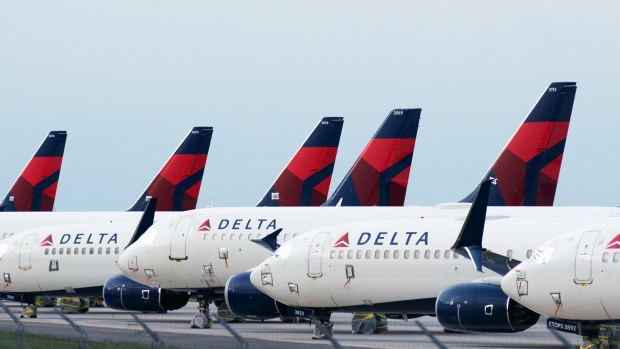Throughout your entire life when you've boarded an airplane, you've been greeted by a flight attendant.
Typically, they are smiling, doing their utmost to make you feel welcome as you board the plane. They also help you get to your seat, get your luggage where it belongs, and generally manage the moods of hundreds of people that are already irritable about trying to fold themselves into a tiny amount of personal space.
They do all of that for free. Because until the plane closes its door, flight attendants do not get paid.
While this seems like some sort of wildly illegal practice, it's not. In fact, it's industry standard and has been for decades, along with a handful of others practices that seem archaic in an industry as crucial as air travel.
"Boarding is our busiest time. We're observing anything from potential security threats, possible emergencies (medical, fire) bag size, resolving seat issues, all while trying to get the door closed for the on-time departure," a veteran flight attendant who wishes to remain anonymous told TheStreet in a phone interview.
She went on to describe more about her experiences in the industry over the past 19 years.
"I've slept in more airports than I can count," she said. "I've spent a lot of money on hotels and Ubers, none of which is reimbursed. If we don't live on base, we are not guaranteed a seat on our flights to or from the airports we need to be at to work."
She also explained that many airlines also use a strict points system for reporting late and absences called "occurrences." After an employee has accumulated a certain amount, they are automatically fired.
"Calling in sick is one occurrence and this included medical leave. I got an occurrence for having a baby," she said. "If I were to take medical leave because I needed chemo, I'd get one. I didn't get one when my mom died, but I had to provide proof of her death [to avoid that]."
Why Delta is Changing its Policies
People have become newly aware of the unpaid boarding practices after a recent company memo from Delta (DAL) stating it will pay flight attendants during the boarding process starting June 2. It is the first U.S. airline to make this move.
While it may look as if Delta chose to make the move to align itself with better practices, it's more likely that the change is the direct result of a tireless union campaign that fought tooth and nail for it.

Shutterstock
The Delta Association of Flight Attendants (AFA), a flight attendant union founded in 1945, played a major role in pushing for change regarding the boarding policy. With more than 50,000 members today, the organization started campaigning in 2019 for Delta to make changes to policies across the board, including pay, benefits, working conditions and profit sharing.
According to the organization, Delta pays "100 million less per year" than airlines like United. This aligns with what the flight attendant we spoke with told us, saying she had long ago topped out on raises and, even so, "could qualify for food stamps."
While the AFA's victory is a milestone, it's also a tenuous one.
"They announced this today, and they can also choose to cancel this policy at any time…unless we have a contract that locks it in," the AFA said on a post on its website made April 25. "Let’s double down on our campaign so we can secure a contract that locks in all of these benefits AND ensures we have a say in our pay, benefits and working conditions every day at Delta."
Will the Industry Follow Delta's Lead?
One thing stands in the way of this policy's potential for change across the airline industry: its effect on customers.
Paying flight attendants during boarding would translate to a higher cost for the consumer, potentially effecting everything from the cost of flights to items purchased on the plane. This explains why the fine print of Delta's new policy shows that the pay for boarding time is only half the hourly rate of inflight pay.
In an industry already struggling to rebound from the losses of the pandemic, these moves may be financially challenging to make. But flight attendants have long been stressed to the breaking point between insufficient pay, overly strict rules, and worsening behavior from passengers over the past few years.
"There's was an uptick in aggressive behavior when Trump became president," the flight attendant told TheStreet. "People had this brazenness [with the flight attendants] that they never had before, because Trump made it OK."
Close to 80% of flight attendants are female, which also indicates an unfortunate similarity to the gender pay gap issue women have fought against for decades.
"If I need compliance from a passenger, they are much more likely to comply if a male pilot makes an announcement than if I ask something of them," the flight attendant said.







